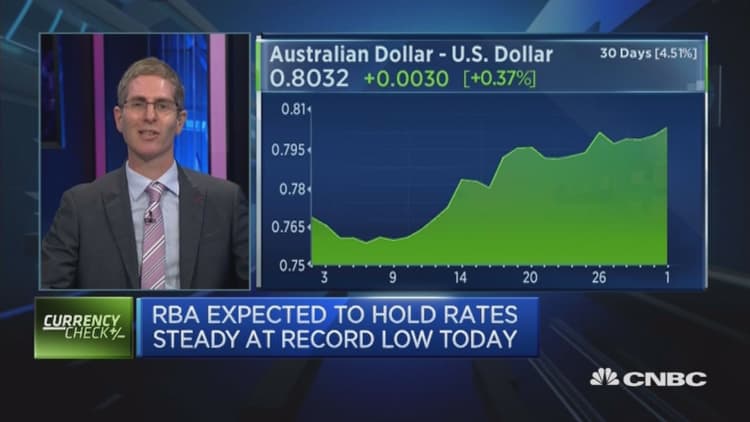The Reserve Bank of Australia kept its benchmark rate unchanged on Tuesday in a widely expected move.
The country's cash rate has stayed at 1.5 percent since August 2016.
On the Australian dollar, the RBA said the recent strength "is expected to contribute to subdued price pressures in the economy."
"It is also weighing on the outlook for output and employment. An appreciating exchange rate would be expected to result in a slower pick-up in economic activity and inflation than currently forecast," RBA governor Philip Lowe said in the central bank's latest statement.
The local currency didn't move much following the release of the monetary policy statement.
The RBA's comments on the Australian dollar may be an indication that the currency's strength has slowed down growth, noted Andrew Ticehurst, executive director and rate strategist at Nomura Australia.
"That's a statement of quite some concern coming through there. It will be interesting to see (when) the RBA puts out a quarterly statement on Friday, so we'll get new forecasts from them. They may be hinting there that their growth could come down a fraction," Ticehurst said on CNBC's "Capital Connection."
The central bank is scheduled to release its quarterly statement on Friday, which will provide updates on key economic indicators such as gross domestic product and inflation.

Market watchers had been awaiting the central bank's comments about the Australian dollar after it climbed from $0.76 to above $0.80 over the last month, partly due to the weakness in the greenback.
"With mining investment still falling, the consumer under pressure and housing construction looking like it is at or close to peaking we need a contribution to growth from trade exposed sectors like tourism, higher education, manufacturing and farming but a rising Australian dollar will work against that," Shane Oliver, head of investment strategy and chief economist at AMP Capital, wrote in a note ahead of Tuesday's policy decision.
"What's more the strength in the Australian dollar will only put more downward pressure on inflation. All of which makes more RBA attempts to jawbone the Australian dollar back down more likely," he added.
Other than the comments on currency, the Australian central bank kept its verbiage largely unchanged from its prior statement. It pointed to a gradually improving economy, though rising household debt remained a concern.


